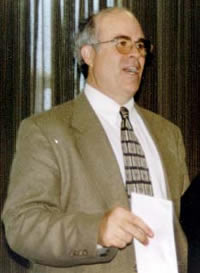1999 Lectureship Recipient

Thomas F. Edgar
Department of Chemical Engineering
University of Texas at Austin
April 29, 1999
|
Abstract |
|
"Information Technology and Chemical Engineering Education: Evolution or Revolution? |
|
Society is undergoing a transformation from the Industrial Age to the Information Age, which is having a profound impact on both industry and academia. Universities have moved to networked environments, which permit faculty, staff, and students to have access to the World Wide Web anytime anywhere. Educators are using information technology (IT) to enhance the quality of education, with an increased focus on the learning process; interaction with students is limited only by bandwidth. Chemical engineering research will be impacted by IT in a number of ways, e.g., increased use of advanced computing to replace experimentation, access to digital libraries and use of intelligent agents for literature searching, and the formation of networks of faculty, who will share ideas and data over the internet on a daily or hourly basis (a virtual collaboration). Faculty will share courses over the internet, write electronic books, and perhaps even form a virtual chemical engineering department using courses from multiple departments. Seers predicts that IT will have a comparable impact to that of the printing press in the 15th century. Whether this change will be evolutionary or revolutionary may become moot, since it will affect all institutions, not just higher education. |
|
Abstract |
|
"Process Engineering in the 21st Century: The Impact of Information Technology" |
|
Much of the progress of process engineering over the past 20 years can be attributed to the continuing advances in digital computing and more generally information technology. The reduction in hardware cost and emergence of standard software packages and architecture have greatly increased the productivity of the process engineer. Fundamental mathematical models are becoming available due to an improved understanding of microscopic and molecular behavior, which could ultimately lead to ab initio process design. This will enable design of a process to yield a product with a given set of target properties, predictable environmental impact, and minimum costs. This lecture also discusses how information technology will change the way chemical plants are designed and operated. The merging of detailed models for design, operations, and control will ultimately provide a unified view of process engineering. The implications of this new process engineering paradigm for chemical engineering education will also be highlighted. |
